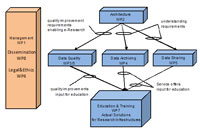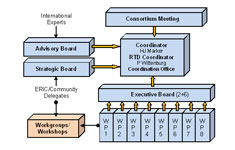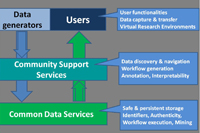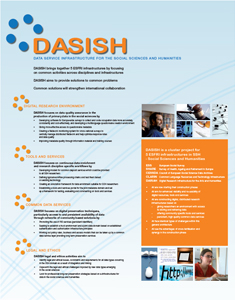The DASISH infrastructure project
The DASISH infrastructure project ended on 31 December 2014.

Connecting Infrastructures
This project brings together all 5 ESFRI research infrastructure initiatives in the social sciences and humanities (SSH) represented each by some centers:
CLARIN – Common Language Resources and Technology Infrastructure
DARIAH – Digital Research Infrastructure for the Arts and Humanities
CESSDA – Consortium of European Social Science Data Archives
ESS – European Social Survey
SHARE – Survey of Health, Ageing and Retirement in Europe
The goal is to determine areas of possible synergies in the infrastructure development and to work on a few concrete joint activities.
The rationale behind
The rationale behind this idea is that
- double developments should be prevented,
- initiatives should mutually benefit from the advanced work of the others and
- to establish joint integrated domains where this makes sense for the SSH users.
Joint activities will be along the following dimensions: understanding the different architectural solutions, assessing and improving data and metadata quality, setting up a tools and services forum, improve the quality of survey data, locate and improve data preservation and curation services, develop a joint shared data access and enrichment framework (AAI, PIDs, joint Metadata, Workflow implementations, joint annotation framework), jointly work on legal and ethical aspects, carry out much training and education work, work on disseminating the results.
The joint activities carried out in the DASISH project is organized in work packages as illustrated in the work package diagram.
Conceptually, the DASISH activities can be understood as belonging to one or more of the layers of the e-Infrastructure as illustrated in the diagram in the top right corner - click to see a larger diagram.
You can also see a large model presentation of the DASISH work packages by clicking on the image below the diagram.
Data Quality
One set of issues in data quality belong in top layer of the e-Infrastructure where the users generate new digital content. The joint activities on these issues are focused on common problems that need solving particularly in the social sciences domain, and the objectives of these activities are
- to develop software for Europe-wide surveys to collect and code occupation data more accurately, consistently and cost-effectively,
- to create, refine and make widely available a multi-language questionnaire development, translation, documentation database tool to aid the design and implementation of cross-cultural research and ensure more effective access to questionnaire metadata,
- to build up and computerise a fieldwork monitoring system for cross-national surveys, which can centrally manage their distributed fieldwork, helping to optimise response rates and data quality.
A different issue in data quality is the issue of architectural solution for data management, curation and access. This mainly belongs in the middle and the lower layers of the model. The objectives of the joint activities are
- to acquire and make available knowledge and expertise on the current data architectures, tools and technologies in use in all five SSH communities,
- to liaise with ongoing international initiatives working on data preservation and access issues,
- to acquire an extensive list of requirements on integration and technical interoperability
- to define and design a reference architecture
Data Archiving
The issues in Data Archiving belong in the middle layer of the model, and the objectives of the joint data archiving activities are
- to discuss the state of long term data preservation in the SSH domain and work out suggestions to overcome current bottlenecks and to establish trust in procedures
- to develop models for common deposit services which could be provided to all SSH researchers
- to work out policy rules, business and access models that can be taken up by a common data service layer providing long term preservation services
Data Enrichment and Shared Data Access
These issue touch on all layers of the model, both the vertical and the horizontal ones.
The joint data enrichment activities have as their objectives
- to improve metadata quality through information material and training courses
- to define typical workflow processing chains and test them based on existing technology
- to create an annotation framework for data enrichment suitable for SSH researchers
The joint shared data access activities are of a technical nature, and the objectives are
to establish a trust environment and a joint data domain based on well established AAI principles (Authentication and Authorisation Infrastructure),
- to establish a tools and services portal for the joint metadata domain and set up a framework for testing, evaluating and commenting on tools and services
- to promote the use of PID services
Legal and Ethics
The objectives of the joint Legal and Ethics activities are
- to identify legal and ethical issues, constraints and requirements for all data types occurring in the SSH domain as a result of integration and linking
- to cope with the legal and ethical challenges imposed by new data types emerging in the social sciences
- to look for professional long-run preservation strategies based on e-Infrastructures for data in the social sciences and humanities.

DASISH (Digital Services Infrastructure for Social Sciences and Humanities) aims to provide solutions to a number of common issues relevant for the five ESFRI projects in social sciences and humanities - CESSDA, CLARIN, DARIAH, ESS and SHARE.
DASISH has identified four major areas of activity namely data quality, data archiving, data access and legal and ethics aspects. The outcome forms the basis for educational activities and for outreach to the communities that are to benefit from the work.
Through DASISH the participating infrastructures will not only obtain new solutions for specific problems and a consolidation of their infrastructure building, but will work out solutions facilitating interdisciplinary cross-walks of their researchers. This will be of mutual benefit for the five infrastructures and the communities they serve.
DASISH brings together 5 ESFRI infrastructures by focusing on common activities across disciplines and infrastructures.
DASISH aims to provide solutions to common problems. Common solutions will strengthen international collaboration.
Digital research environment
DASISH focuses on data quality assurance in the production of primary data in the social sciences by
- Developing software for Europe-wide surveys to collect and code occupation data more accurately, consistently and cost-effectively, and developing a multilanguage questionnaire creation environment
- Giving more effective access to questionnaire metadata
- Creating a fieldwork monitoring system for cross-national surveys to centrally manage distributed fieldwork and help optimize response rates and data quality
- Improving metadata quality through information material and training courses
Tools and services
DASISH focuses on continuous data enrichment and research discipline specific workflows by
- Developing models for common deposit services which could be provided to all SSH researchers
- Defining typical workflow processing chains and test them based on existing technology
- Creating an annotation framework for data enrichment suitable for SSH researchers
- Establishing a tools and services portal for the joint metadata domain and set up a framework for testing, evaluating and commenting on tools and services
Common data services
DASISH focuses on digital preservation techniques, particularly access to and persistent availability of data through networks of community based solutions by
- Promoting the use of PID services (persistent identifiers)
- Seeking to establish a trust environment and a joint data domain based on established authentication and authorisation infrastructure principles
- Working out policy rules, business and access models that can be taken up by a common data service layer providing long term preservation services
Legal and ethics
DASISH legal and ethics activities aim to
- Identify legal and ethical issues, constraints and requirements for all data types occurring in the SSH domain as a result of integration and linking
- Cope with the legal and ethical challenges imposed by new data types emerging in the social sciences
- Look for professional long-run preservation strategies based on e-Infrastructures for data in the social sciences and humanities
The Executive Board
The Executive Board (EB) in which all Work Package (WP) leaders are represented including the two coordinators who also lead WP1 and WP5 takes the relevant decisions to achieve the intended results.
Advisory Board
The Advisory Board members are international experts from the Social Sciences and Humanities domains. The Advisory Board gives advice about the relevance of the work being done.
Strategic Board
The Strategic Board members are delegates from the 5 infrastructures (ERICs when they have been established) and also delegates from the EC.
Coordinators
The coordinators lead the DASISH work, take care that decisions are put in action, take care of the compliance with all advice and requests from the Advisory Board and the consortium meeting, take care of compliance with the grant agreement and interact closely with the EC. The coordinators are supported by a coordination team. The coordinator is taking care of the work in WP1, WP6, WP7 and WP8, the RTD coordinator that of WP2, WP3, WP4 and WP5.
Consortium meeting
The consortium meeting includes all partners and controls the work carried out at strategic level.


| Country | Institution | Unit | City | Contact | Code |
|---|---|---|---|---|---|
| Austria | Austrian Academy of Sciences | The Institute for Corpus Linguistics and Text Technology | Vienna | Gerhard Budin | OEAW |
| Denmark | University of Copenhagen | Centre for Language Technology | Copenhagen | Hanne Fersøe | UCPH |
| Estonia | University of Tartu | Institute of Computer Science | Tartu | Kadri Vider | UT |
| Finland | University of Tampere | Finnish Social Science Data Archive | Tampere | Taina Jääskeläinen | UTA |
| Germany | Max-Planck-Institute for Psycho Linguistics | The Language Archive | Munich | Wolfgang Klein | MPG |
| Germany | Max Planck Institute for Social Law and Social Policy | Munich Center for the Economics of Aging | Munich | Axel Börsch-Supan | MPG |
| Germany | University of Goettingen | Goettingen State and University Library | Goettingen | Norbert Lossau | UGOE |
| Germany | GESIS | Leibniz Institute for the Social Sciences | Mannheim | Markus Quandt | GESIS |
| Ireland | The National University of Ireland Maynooth | Irish Qualitative Data Archive | Maynooth | Jane Gray | NUIM |
| Italy | University of Venice “Ca’ Foscari” | Department of Economics | Venice | Agar Brugiavini | UNIVE |
| Netherlands | Tilburg University | CentERdata | Tilburg | Marcel Das | CentERdata |
| Netherlands | Royal Netherlands Academy of Arts and Sciences | Data Archiving and Networked Services | Amsterdam | Peter Doorn | DANS |
| Norway | Norwegian Social Science Data Services | Bergen | Bjørn Henrichsen | NSD | |
| Norway | University of Bergen | Department of Linguistic, Literary and Aesthetic Studies | Bergen | Koenraad De Smedt | UiB |
| Spain | Universitat Pompeu Fabra | Institute for Applied Linguistics | Barcelona | Núria Bel | UPF |
| Sweden | University of Gothenburg | Swedish National Data Service, SND | Gothenburg | Hans Jørgen Marker | UGOT |
| United Kingdom | King’s College London | Centre for e-Research | London | Tobias Blanke | KCL |
| United Kingdom | University of Essex | UK Data Archive | Colchester | Hilary Beedham | UEssex |
| United Kingdom | City University London | Centre for Comparative Social Surveys | London | Rory Fitzgerald | CITY |
Members of the DASISH boards are in the process of being appointed, and the lists of board members will be filled in when the process is concluded.
Scientific Advisory Board Members
| Titel | Name | Affiliation | Country |
|---|---|---|---|
| Professor | Ruta Marcinkeviciene | Vytautas Magnus University | Lithuania |
| Professor | Niels Ole Finnemann | Aarhus University | Denmark |
| Professor | Sverker Holmgren | Uppsala University | Sweden |
| Professor | Jinkook Lee | Pardee RAND Graduate School | USA |
| Professor | Peter Mohler | University of Mannheim | Germany |
Strategic Board Members
| Name | Community | Country |
|---|---|---|
| Bjørn Henrichsen | CESSDA | Norway |
| Bente Maegaard | CLARIN | Denmark |
| Henk Harmsen | DARIAH | The Netherlands |
| Rory Fitzgerald | ESS | United Kingdom |
| Axel Börsch-Supan | SHARE | Germany |
Funding
DASISH is a FP7-INFRASTRUCTURES-2011-1 project
Grant Agreement 283646, Combination of CP & CSA.
Project period: 1 January 2012 - 31 December 2014
Contact
Sussi Olsen
Centre for Language Technology
Department of Nordic Studies and Linguistics
University of Copenhagen




